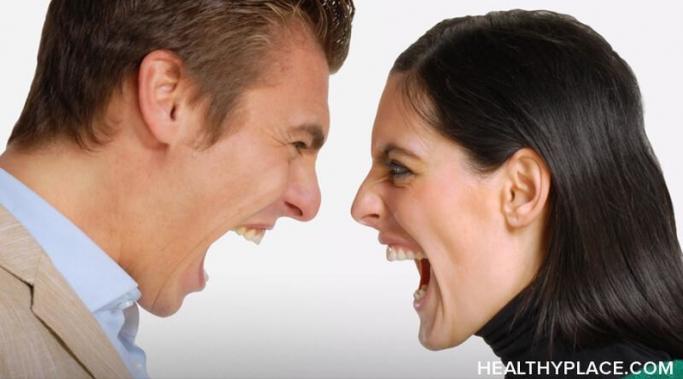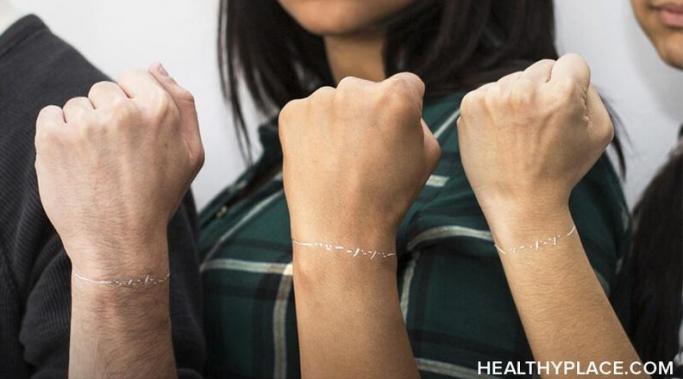Blogs
I watched The Burning Bed this week. Farrah Fawcett plays abused wife Francine Hughes who murdered her husband after suffering years of abuse. In court, Sarah Hughes was found innocent by reason of temporary insanity (Battered Woman Syndrome).
After watching the movie, I wanted to find out more about the case and ran across an interview in which a man from the Hughes' town said that Francine beat her husband, too. He saw her beating him right there on the sidewalk outside his door and the police were called to separate them.
My stomach felt sick. His viewpoint of the Hughes' fight reflected the views of many people looking into an abusive relationship - the victim dished it out as good as she got. They're both at fault (What Are Victims Responsible for in an Abusive Relationship?).
National Eating Disorders Awareness Week 2011 starts this Sunday. This year's theme is "It's Time to Talk About It."
Talking about it means dispelling the myths surrounding eating disorders. Anorexia nervosa is not just an illness of upper middle-class and wealthy adolescent females. Bulimia nervosa is a deadly illness even if the person suffering from it is at a normal weight. Binge eating isn't just eating an extra cookie or two.
Eating disorders are real illnesses that can kill.
It may seem obvious: that one should recognize any progress made in terms of mental health recovery but if I don't stop and look, it's all too easy to (dis)miss; The things that have changed in terms of treating anxiety and PTSD recovery are never the things I would've expected when I started all this.
I also have the baggage that usually goes along with anxiety disorders: great expectations. I'll bend over backwards trying to achieve the very things I think will help me, simultaneously imagining that they're impossible for me.
It has come to our attention recently that our child is kind of a brat.
I'm not talking about Bob--I'm talking about his younger brother, "Two." It seems we pay such close attention to Bob (particularly this time of year), we've completely failed to notice the other little monster we're creating.
I’m bipolar. Now wait, before you start to tell me about how “I’m a person with bipolar disorder,” you might want to know, I don’t care. I use the English language in a non-politically correct way. Call it a quirk.
I have a new one for you: I am stalked by bipolar disorder. Kind of like an angry ex-boyfriend for whom you have a restraining order but insists on constantly scaring and tormenting you anyway.
My mind would swirl around and refuse to be still during my time with him. I would start a project and then throw it aside, or begin cleaning the bathroom and then find myself folding clothes while the bathroom went unfinished. I'd decide to go to the grocery but somehow forget to go because the mess in my head distracted me and tossed me in another direction.
If you're a child abuse survivor you've no doubt heard "get over it" on more than one occasion. But I hope no one ever gets over child abuse. The fact that child abuse hurts kids really ought to be enough to garner everyone's attention. Beyond that nasty reality, there's the fact that the effects of child abuse are often lasting, continuing to impact survivors and by extension their friends, families, and co-workers throughout their adult lives. Like it or not, child abuse impacts everyone in one way or another.
The longest recorded kiss in the world was set a couple of days ago on Valentine’s Day. The smooch clocked in at 46 hours and 24 minutes by a couple in Pattaya, Thailand, in a Kissathon contest in which they won a diamond ring and cash. This couple must really, really like each other to be joined at the lips for over a day, or they are the most competitive people I know.
I've often said that Indiana's mental health laws are about 50 years behind where they need to be. Even in Indianapolis, where mental health treatment is relatively cutting-edge, there are still problems, especially when it comes to involuntary hospitalization.
I've been hospitalized against my will three times. Those interventions were in my best interest. But not everyone's experiences with forced treatment are helpful. Psychiatric survivors have experienced human rights violations in the mental health system and are speaking out about injustices that can occur when people are denied their right to choose.








